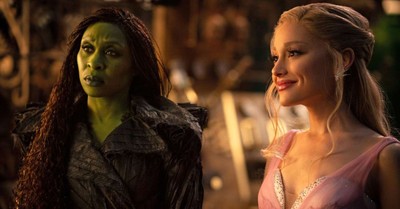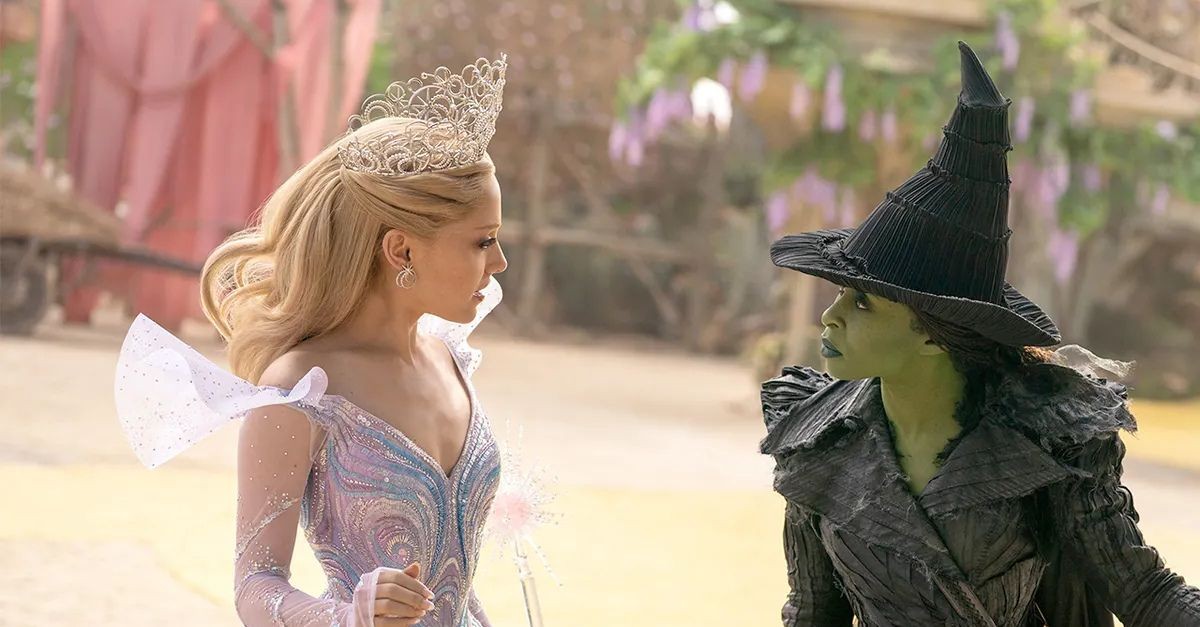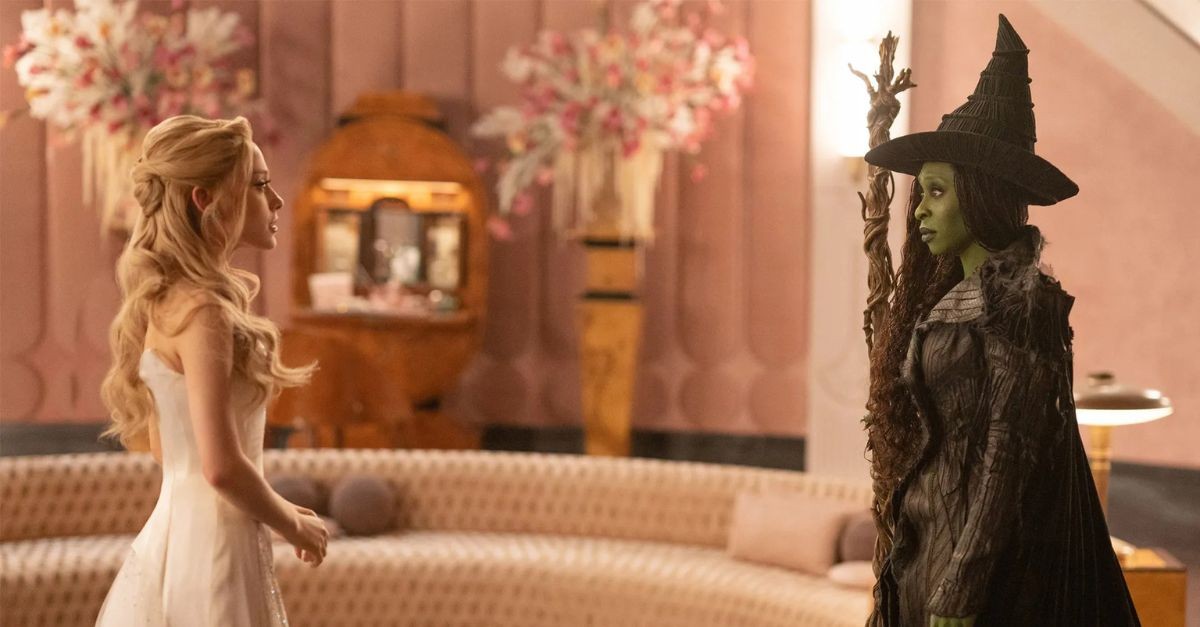4 Things Parents Should Know about Wicked: For Good
Movie Features


Audio By Carbonatix
By Michael Foust, Crosswalk.com
Glinda is a beloved figure in the Land of Oz as the spokeswoman for their beloved leader, the wizard. The citizens love her. They even sing soaring songs about her. In their mind, she represents all that is good and true – and stands as a shining symbol of everything they hope Oz can be.
Her best friend, though, hasn’t had it so – well – good. That would be Elphaba, the green-skinned outsider who once attended college classes with Glinda during the day and stayed up talking at night, forming a deep friendship neither of them expected.
Elphaba is known to the citizens of Oz as the Wicked Witch of the West – the magical menace who (supposedly) destroys property and (allegedly) kills people … simply for fun. She flies on a broom and lives in a mysterious lair in the forest – a hideout the Wizard’s palace guard has been desperately trying to locate, but so far without success.
The citizens don’t know about their friendship – and Glinda wants to keep it that way.
As if things weren’t tangled enough, Glinda’s fiancé – Fiyero – now serves as head of the palace guard and has been firmly instructed to find and capture the witch.
Glinda, though, urges him to call off the search.
“She doesn’t want to be found,” Glinda tells him. “She’s made her choice.”
Will Elphaba ever be found? And can Glinda keep her secret safe?
It’s all part of the new musical Wicked: For Good (PG), a continuation of the 2024 blockbuster Wicked that was the third highest-grossing film of the year. Both are adaptations of the stage musical.
Here are four things parents should know:
Photo Credit: ©Universal Pictures

It’s a Prequel and the Backstory to a Classic
Both Wicked and Wicked: For Good are prequels to The Wonderful Wizard of Oz, the classic book that was made into a popular black-and-white movie in 1939 starring Judy Garland.
In 2024’s Wicked, we learned that Elphaba (Cynthia Erivo) and Glinda (Ariana Grande) enrolled in school at Shiz University, where they became friends and roommates – only to go their separate ways when Elphaba refused to support the Wizard’s corrupt agenda. In the film’s final scene, she flies away on a broom.
Wicked: For Good picks up several years after that first film, with Elphaba living in isolation and Glinda preparing for her marriage to Fiyero.
The newest film provides the backstory to the classic tale – we witness the construction of the yellow brick road and learn the origins of the Tin Man and Scarecrow, for example – while directly flowing into the story itself. We learn why there was a tornado, and we watch Dorothy’s house crash into the Land of Oz. We even witness the moment that leads to Dorothy donning the ruby slippers.
Smartly, though, the movie never directly shows us Dorothy’s face, as the classic story serves more as a backdrop to the film’s central narrative about Elphaba and Glinda. Garland will forever be Dorothy – a legacy the film protects by letting her remain unseen.
Photo Credit: ©Universal Pictures

It’s a Darker, Less Innocent Film than Its Predecessor
The first Wicked film had its edgy moments, but mostly stayed in lighter territory thanks to its character-building humor and its focus on the growing friendship between Glinda and Elphaba.
Wicked: For Good begins innocently enough, but soon pushes its PG rating with a bedroom-like scene, multiple dark spells, and even an angry Tin Man shouting a song about his desire to kill the witch.
Of course, this may not be surprising to fans of the stage musical, but parents who don’t know the story might be shocked when they take their little ones, expecting a gentle Oz adventure.
The film’s bedroom-like scene takes place after Fiyero declares his love for Elphaba and essentially abandons Glinda at the altar, fleeing into the forest with Elphaba, where he discovers her hideaway and begins imagining a future with her. As they sing, she removes her cloak and outer garments, leaving her in what appears to be a shirt and shorts. He loosens his suspenders, and they embrace as her magic lifts them just above her bed. Toward the end of the sequence, they land on the bed and kiss passionately before the scene cuts away. Moments later, when the film returns to them, his shirt is off and she’s wrapped in a blanket, both lying in bed. It’s certainly far more than you’d see in a family Hallmark movie and clearly implies a physical relationship that is far from kid-friendly.
Photo Credit: ©Universal Pictures

It’s Also about Good and Evil
You can argue that Wicked: For Good is a morally ambiguous movie about a witch who really isn’t wicked and a kingdom where truth is relative. But you can just as easily posit that the film is filled with examples of good and evil – and that they’re just less obvious because the one character we expect to be evil is anything but.
In this film, Glinda is good, Madame Morrible is wicked, and the Wicked Witch – Elphaba – is a character who turned to evil deeds because she was bullied. No doubt, that’s a real-world occurrence. Children who are mistreated and who grow up in a poor family life – like Elphaba – are indeed more likely to live a life of crime. That doesn’t mean they’re innocent before God – they’re not. It simply means we, as the body of Christ, must do a better job of being His hands and feet and of spreading His love to those on the margins of society.
If anything, Wicked: For Good is a story about redemption – a story of a green-skinned girl who’s given a second chance and chooses to turn back toward the light.
“Because of you,” Elphaba tells Glinda at the end, “I have been changed for good.”
She wasn’t wicked forever. Isn’t that good news?
Rated PG for action/violence, some suggestive material, and thematic material. Coarse language: none.
Entertainment rating: 3 out of 5 stars.
Family-friendly rating: 3 out of 5 stars.
Discussion questions: What does Scripture say about truth? What would you say to someone who claims truth is relative? What are the origins of evil? Is there someone in your life that needs the love of Jesus?
Photo Credit: ©Universal Pictures

























